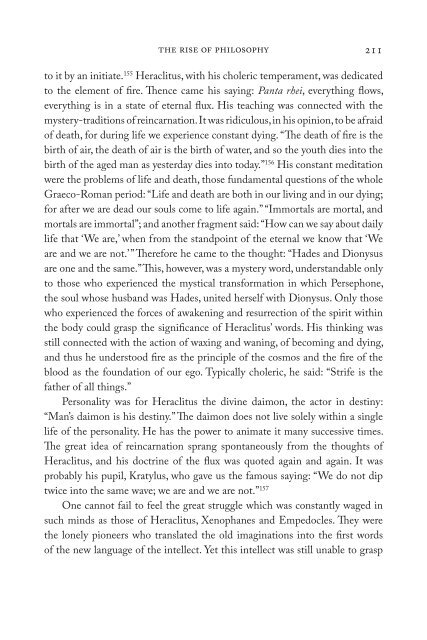The Gospel of Hellas - Research Institute for Waldorf Education
The Gospel of Hellas - Research Institute for Waldorf Education
The Gospel of Hellas - Research Institute for Waldorf Education
You also want an ePaper? Increase the reach of your titles
YUMPU automatically turns print PDFs into web optimized ePapers that Google loves.
the rise <strong>of</strong> philosophy<br />
to it by an initiate. 155 Heraclitus, with his choleric temperament, was dedicated<br />
to the element <strong>of</strong> fire. <strong>The</strong>nce came his saying: Panta rhei, everything flows,<br />
everything is in a state <strong>of</strong> eternal flux. His teaching was connected with the<br />
mystery-traditions <strong>of</strong> reincarnation. It was ridiculous, in his opinion, to be afraid<br />
<strong>of</strong> death, <strong>for</strong> during life we experience constant dying. “<strong>The</strong> death <strong>of</strong> fire is the<br />
birth <strong>of</strong> air, the death <strong>of</strong> air is the birth <strong>of</strong> water, and so the youth dies into the<br />
birth <strong>of</strong> the aged man as yesterday dies into today.” 156 His constant meditation<br />
were the problems <strong>of</strong> life and death, those fundamental questions <strong>of</strong> the whole<br />
Graeco-Roman period: “Life and death are both in our living and in our dying;<br />
<strong>for</strong> after we are dead our souls come to life again.” “Immortals are mortal, and<br />
mortals are immortal”; and another fragment said: “How can we say about daily<br />
life that ‘We are,’ when from the standpoint <strong>of</strong> the eternal we know that ‘We<br />
are and we are not.’ ” <strong>The</strong>re<strong>for</strong>e he came to the thought: “Hades and Dionysus<br />
are one and the same.” This, however, was a mystery word, understandable only<br />
to those who experienced the mystical trans<strong>for</strong>mation in which Persephone,<br />
the soul whose husband was Hades, united herself with Dionysus. Only those<br />
who experienced the <strong>for</strong>ces <strong>of</strong> awakening and resurrection <strong>of</strong> the spirit within<br />
the body could grasp the significance <strong>of</strong> Heraclitus’ words. His thinking was<br />
still connected with the action <strong>of</strong> waxing and waning, <strong>of</strong> becoming and dying,<br />
and thus he understood fire as the principle <strong>of</strong> the cosmos and the fire <strong>of</strong> the<br />
blood as the foundation <strong>of</strong> our ego. Typically choleric, he said: “Strife is the<br />
father <strong>of</strong> all things.”<br />
Personality was <strong>for</strong> Heraclitus the divine daimon, the actor in destiny:<br />
“Man’s daimon is his destiny.” <strong>The</strong> daimon does not live solely within a single<br />
life <strong>of</strong> the personality. He has the power to animate it many successive times.<br />
<strong>The</strong> great idea <strong>of</strong> reincarnation sprang spontaneously from the thoughts <strong>of</strong><br />
Heraclitus, and his doctrine <strong>of</strong> the flux was quoted again and again. It was<br />
probably his pupil, Kratylus, who gave us the famous saying: “We do not dip<br />
twice into the same wave; we are and we are not.” 157<br />
One cannot fail to feel the great struggle which was constantly waged in<br />
such minds as those <strong>of</strong> Heraclitus, Xenophanes and Empedocles. <strong>The</strong>y were<br />
the lonely pioneers who translated the old imaginations into the first words<br />
<strong>of</strong> the new language <strong>of</strong> the intellect. Yet this intellect was still unable to grasp

















